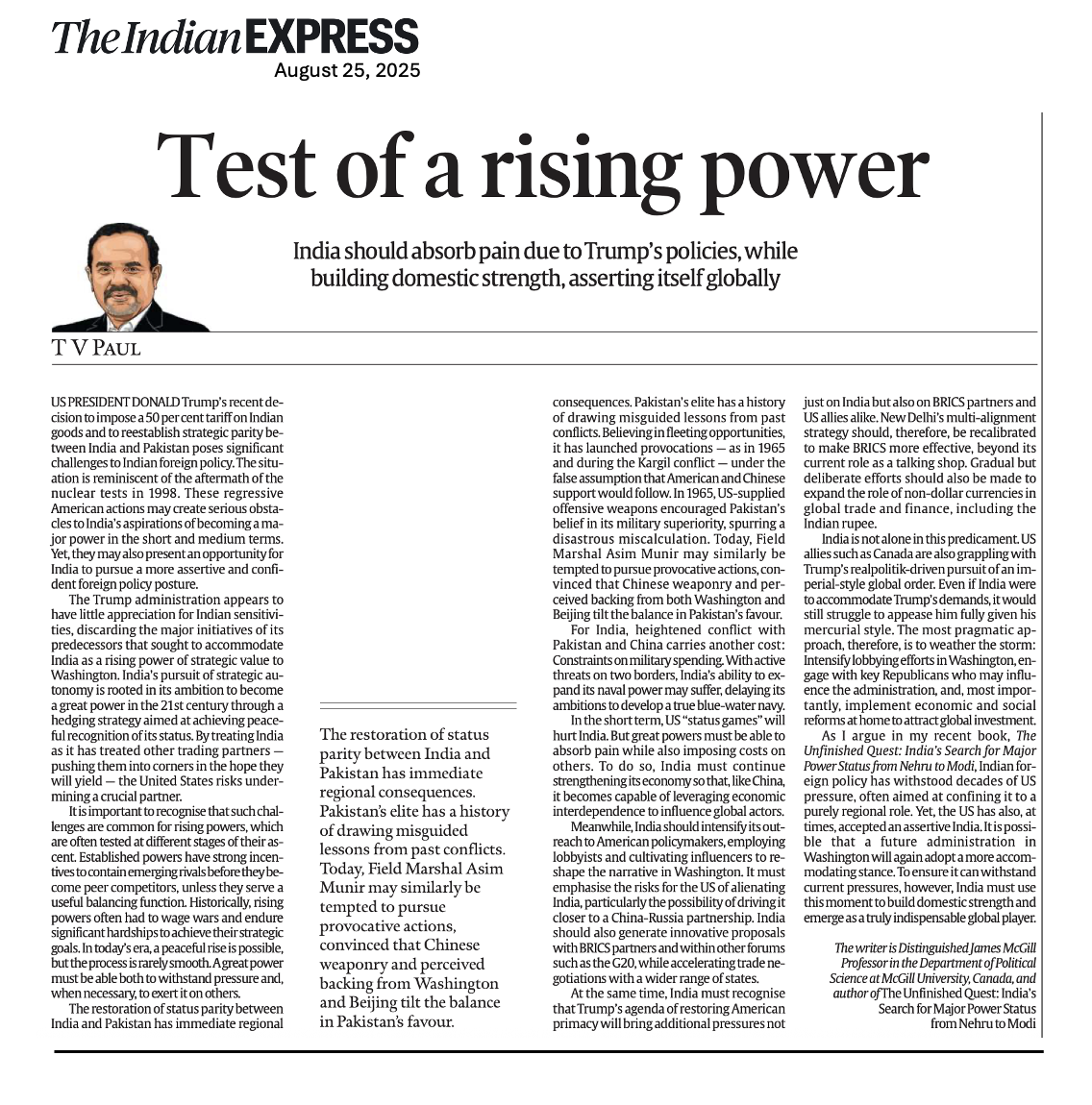Test Of a Rising Power by T.V. Paul Abstract US President Donald Trump’s recent decision to impose a 50 per cent tariff on Indian goods and to reestablish strategic parity between India and Pakistan poses significant challenges to Indian foreign policy. The situation is reminiscent of the aftermath of the nuclear tests in 1998. These […]
Blogs
Manmohan Singh’s visionary policies gave India recognition as ‘Rising Power’ by T.V. Paul Abstract Despite their political differences, the current Indian establishment should recognise his contributions appropriately, in particular, in bringing India to the forefront of the international system as a rising power and giving hope for the rise of it as a legitimate major […]
India’s National Elections 2024: Deciphering Foreign Policy Implications by T.V. Paul Abstract As Indian Prime Minister Narendra Modi appears likely to return to power in April-May 2024 for a third consecutive term in the country’s consequential national elections, Canadians will be watching how voters in India – the world’s largest democracy – decide not only […]
The rising power paradigm and India’s 2024 general elections by T.V. Paul Abstract India, the world’s largest democracy, is holding its national elections over a six-week period starting 19 April. The elections to the 543-member lower house of the parliament (Lok Sabha) with an electorate, numbering 968 million eligible voters, assumes critical importance as India […]
By T.V. Paul and Amitav Acharya Abstract As two past presidents of ISA who originally came from the Global South, and who maintain substantial teaching and research links there, we have witnessed the association’s progress in inclusivity. The intellectual perspective on ‘Global IR’ that Acharya has promoted is increasingly accepted as an approach of significance […]
Michael Brecher: Pioneering scholar of Indian foreign policy Abstract Brecher, who retired as a distinguished professor at McGill University’s political science department last year after a nearly seven-decade-long stellar career, passed away at the age of 96 on January 16. He had made enormous scholarly contributions on topics such as Indian and Israeli foreign policies, […]
(De-)Globalization and International Order by Markus Kornprobst & T.V. Paul Abstract What will become of liberal order as “deglobalizing” pressures continue to mount? And what happens to globalization as liberal order comes under increasing pressure? Indicators of economic interdependence show signs of plateauing. Even as NATO and Russia square off against one another, the alliance faces significant internal challenges. From decreasing […]
The Corona Virus Crisis: The Latest of Many Challenges to the Liberal International Order Abstract The current corona virus crisis is the latest of a series of challenges that the liberal international order has faced during the past several decades. A number of illiberal, populist leaders have emerged in the US, Brazil, India, Turkey, and […]
China-US Rivalry: Sleepwalking Into War? If confidence building measures and the adoption of an arms control regime in the South China Sea, China and the US risk stumbling into a catastrophic war. Source: https://madrascourier.com/policy/china-us-rivalry-sleepwalking-into-war/
Future of International Institutions and Soft Balancing Institutions have long been used as a means for soft balancing, including by the US. However, the US and its allies cannot ignore the norms of the rules based international order, for to do so risks undermining the shared norms soft balancing depends on. Source: http://blog.yalebooks.com/2018/10/18/the-future-of-international-institutions-and-soft-balancing/

